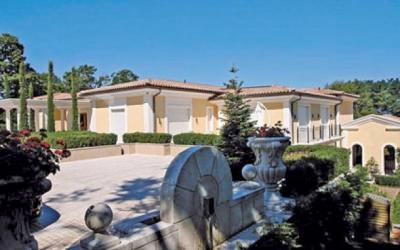Finding out how the superrich think

One in ten billionaires worldwide lives in Switzerland and 210,700 people possess more than $1 million (SFr990,000). But what makes these people tick?
A study by a team of sociologists from Basel University has looked into the lives of the country’s wealthy to find out about their power, relations to society and the rich-poor gap.
According to the Basel sociology professor Ueli Mäder and his other two team members Sarah Schilliger and Ganaga Jey Aratnam, a person needs at least SFr30 million to be considered rich – and at least SFr100 million to be considered superrich.
Their book, How the rich think and act, published on Wednesday, looks at who these people are and how they live. It also considers the importance of wealth within society and for the economy.
For this, the team carried out interviews with the well-to-do and observed their lifestyles, including where they send their children to school and what they do in their free time. They also spoke to experts and others with dealings with the rich. Scientific data and media reports were analysed.
The study confirms that wealth and power go hand in hand. “Having capital means having power. However, the rich don’t necessarily have the positions of power in Switzerland,” Schilliger told swissinfo.ch.
“But there is now a superrich person in the cabinet with the arrival of [mechanical engineering company millionaire] Johann Schneider-Ammann.”
Power is exercised through networks and in a very targeted way that benefits the rich, the study found.
Haves and have nots
In addition, wealth in Switzerland is concentrated: three per cent of the population have as much wealth as the remaining 97 per cent put together.
Thus a small minority benefits disproportionately from inheritance law – which is cantonal and mostly exempts direct inheritors from tax – and the low net-worth tax.
How do these decisions get through at the ballot box, given that the whole Swiss population votes on them? For Mäder this is an interesting question.
“But there have also been rich people who have asked me why a majority want to get rid of inheritance tax when it could help 80 per cent of the population,” he said.
There seems to be the hope that if the wealthy are doing well, there will be some crumbs for the rest of society, explained the professor.
Schilliger says people feel you can go from being a washing-up boy to a millionaire.
“This gives wealth an enormous legitimacy for society. Social inequality is accepted, which we sociologists find rather hard to understand.”
No clichés
Switzerland is a rich country, despite having no real natural resources. Schilliger says this doesn’t come from the cliché of the punctual, hardworking, frugal Swiss.
“Historically speaking, Switzerland, although not a colonial power, became rich through colonialism,” she said, adding that many Swiss gained wealth by exploiting resources in the southern hemisphere.
Neutrality has also played a role. “As the country has mostly kept out of conflicts, there has been a continuity to its wealth, which contrasts with Germany, for example.”
The fact that many multinationals, such as Nestlé or Novartis, are also based here also helps, adds the sociologist. “Their foreign labour force contributes a lot to building up wealth here. Switzerland could be said to be one of the great profiteers of globalization.”
But globalisation is not a golden goose for everyone. Since the mid-1970s the gap between the rich and poor has been growing, despite the fact that social-welfare spending would seem to have gone up.
Big gap
“Spending has only gone up in absolute figures,” points out Mäder. “If you put this into relation with Gross Domestic Product, the far greater sum, we unfortunately see that spending has fallen since 2004,” he said.
The amounts spent on social security are already quite low, despite the country having a good social welfare system in comparison with other countries, he argues.
“But this system doesn’t keep abreast of social change. It is geared towards the nuclear family, working fulltime and a job for life. These assumptions become less and less relevant. This makes life difficult for increasing numbers of people.”
The study has come up with proposals to tackle the problem, including a progressive wealth tax as well as inheritance tax. It also recommends measures such as higher salaries for those on lower incomes.
Mäder says more must be done to plug the rich-poor gap, which is problematic for society. “Just how much wealth can society cope with if keeps on being so one-sided?” he asks.
One tenth of a per cent of the world’s population live in Switzerland which possess more than one per cent of the global gross national product.
The country ranks 20th worldwide in terms of exports and 19th in terms of imports.
210,700 of the country’s 7.5 million inhabitants possess more than $1 million. 3% of tax payers have as much wealth as the remaining 97%.
85% have less than SFr100,000 net worth, which is 6% of all worth.
According to Bilanz magazine, the wealth of the 300 richest people in the country has risen from SFr86 billion to SFr449 billion (2009).
Switzerland is the largest offshore financial centre globally with a market share of 27% and managed wealth of $2.1 trillion.
(Adapted from German by Isobel Leybold-Johnson)

In compliance with the JTI standards
More: SWI swissinfo.ch certified by the Journalism Trust Initiative












You can find an overview of ongoing debates with our journalists here . Please join us!
If you want to start a conversation about a topic raised in this article or want to report factual errors, email us at english@swissinfo.ch.